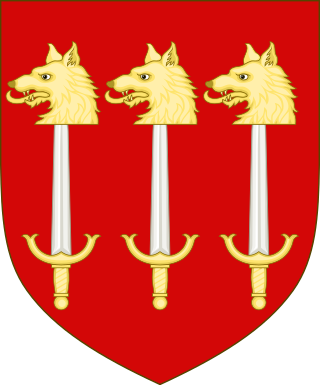
Baron Macdonald, of Slate in the County of Antrim, is a title in the Peerage of Ireland. It was created in 1776 for Sir Alexander Macdonald, 9th Baronet, of Sleat. The Macdonald family of Sleat descends from Uisdean Macdonald, also known as Hugh of Sleat, or Hugh Macdonald, who was an illegitimate son of Alexander Macdonald, Earl of Ross. On 28 May 1625, his great-great-great-great-grandson Donald Gorm Og Macdonald was created a baronet, of Sleat in the Isle of Skye in the County of Inverness, in the Baronetage of Nova Scotia. The baronetcy was created with remainder to heirs male whatsoever and with a special clause of precedence which provided that it should have precedency over all former baronets.

The House of Burnett is a Lowland and Border Scottish family composed of several branches. The Chief of the Name and Arms of Burnett is James Comyn Amherst Burnett of Leys.

Clan Seton is a Scottish clan which does not currently have a chief; therefore, it is considered an armigerous clan.

Clan Dewar is a Scottish clan.

Clan Johnstone is a Border Reiver Scottish clan.

Clan Macdonald of Sleat, sometimes known as Clan Donald North and in Gaelic Clann Ùisdein[kʰl̪ˠan̪ˠ ˈuːʃtʲɛɲ], is a Scottish clan and a branch of Clan Donald—one of the largest Scottish clans. The founder of the Macdonalds of Sleat was Ùisdean, or Hugh, a 6th great-grandson of Somerled, a 12th-century Lord of the Isles. The clan is known in Gaelic as Clann Ùisdein, and its chief's Gaelic designation is Mac Ùisdein, in reference to the clan's founder. Both the clan and its clan chief are recognised by the Lord Lyon King of Arms, who is the heraldic authority in Scotland.

The Forresters are an ancient and noble clan of the Scottish Lowlands.

Clan Skene is a Scottish clan.

Clan Irvine is a Scottish clan.
Clan Strachan is a Scottish clan originating from the barony of Strachan, in Aberdeenshire. The clan does not have a chief, therefore it is considered by Court of the Lord Lyon and the Stand Council of Scottish Chiefs as an Armigerous clan.

Clan Maitland is a Lowland Scottish clan.

Clan Stewart is a Scottish Highland and Lowland clan. The clan is recognised by Court of the Lord Lyon; however, it does not have a Clan Chief recognised by the Lord Lyon King of Arms. Because the clan has no chief it can be considered an armigerous clan; however, the Earls of Galloway are now considered to be the principal branch of this clan, and the crest and motto of The Earls of Galloway's arms are used in the Clan Stewart crest badge. The Court of the Lord Lyon recognises two other Stewart/Stuart clans, Clan Stuart of Bute and Clan Stewart of Appin. Clan Stuart of Bute is the only one of the three clans at present which has a recognised chief.

Clan Swinton is a Scottish clan of the Scottish Lowlands.

Clan Crawford is a Scottish clan of the Scottish Lowlands. The clan is of Scandinavian and Anglo-Saxon origin. Since the early 18th century a belief has been held by some historians that the clan had Norman origins. While historically recognised as a clan by the Court of the Lord Lyon, it is now an armigerous clan as it no longer has a chief. The last chief was Hugh Ronald George Craufurd, who sold his land and moved to Canada in 1904. He died in Calgary in 1942, leaving no male heirs.

Clan Kirkpatrick is a Lowland armigerous Scottish clan. There are several variations of the Kirkpatrick name: Kilpatric, Kilpatrick, and Gilpatrick. The names Kirkpatrick and Kilpatrick may have been interchangeable at one time. The clan is recognised by the Court of the Lord Lyon, however the clan does not currently have a chief so recognised. The surname Kirkpatrick is also a recognized sept of Clan Douglas and Clan Colquhoun.

Clan Craig is a Scottish clan hailing from Aberdeenshire. The clan does not have a chief recognized by the Lord Lyon King of Arms, therefore the clan has no standing under Scots Law. Clan Craig is considered an armigerous clan, meaning that it is considered to have had at one time a chief who possessed the chiefly arms, however no one at present is in possession of such arms.

Clan Bissett is a Scottish clan. The clan is recognised by the Lord Lyon King of Arms but does not have a clan chief recognised by the Lord Lyon King of Arms, therefore the clan has no standing under Scots Law. Clan Bissett is considered an armigerous clan, meaning that it is considered to have had at one time a chief who possessed the chiefly arms; however, no one at present is in possession of such arms. The surname Bissett is also considered a sept of the Clan Fraser of Lovat.

Clan Pollock is an armigerous Scottish clan whose origin lies in a grant of land on the southern bank of the River Clyde, courtesy of King David I, to the sons of Fulbert from Walter fitz Alan, the 1st High Steward of Scotland, in the 12th century. It is among the oldest recorded surnames in Scotland. The clan is a sept of Clan Maxwell.

Clan Little is a Scottish clan of the Borders. The clan does not currently have a chief and is therefore considered an armigerous clan. The Clan Little Society had a Guardian in place of a clan chief but, since his death in 2007, no suitable successor has appeared.
Clan McKerrell, also known as Clan MacKerrell, is Scottish clan. The clan is officially recognized by the Court of the Lord Lyon, however as it does not currently have a chief recognized by the Lord Lyon King of Arms it is considered an Armigerous clan.


















